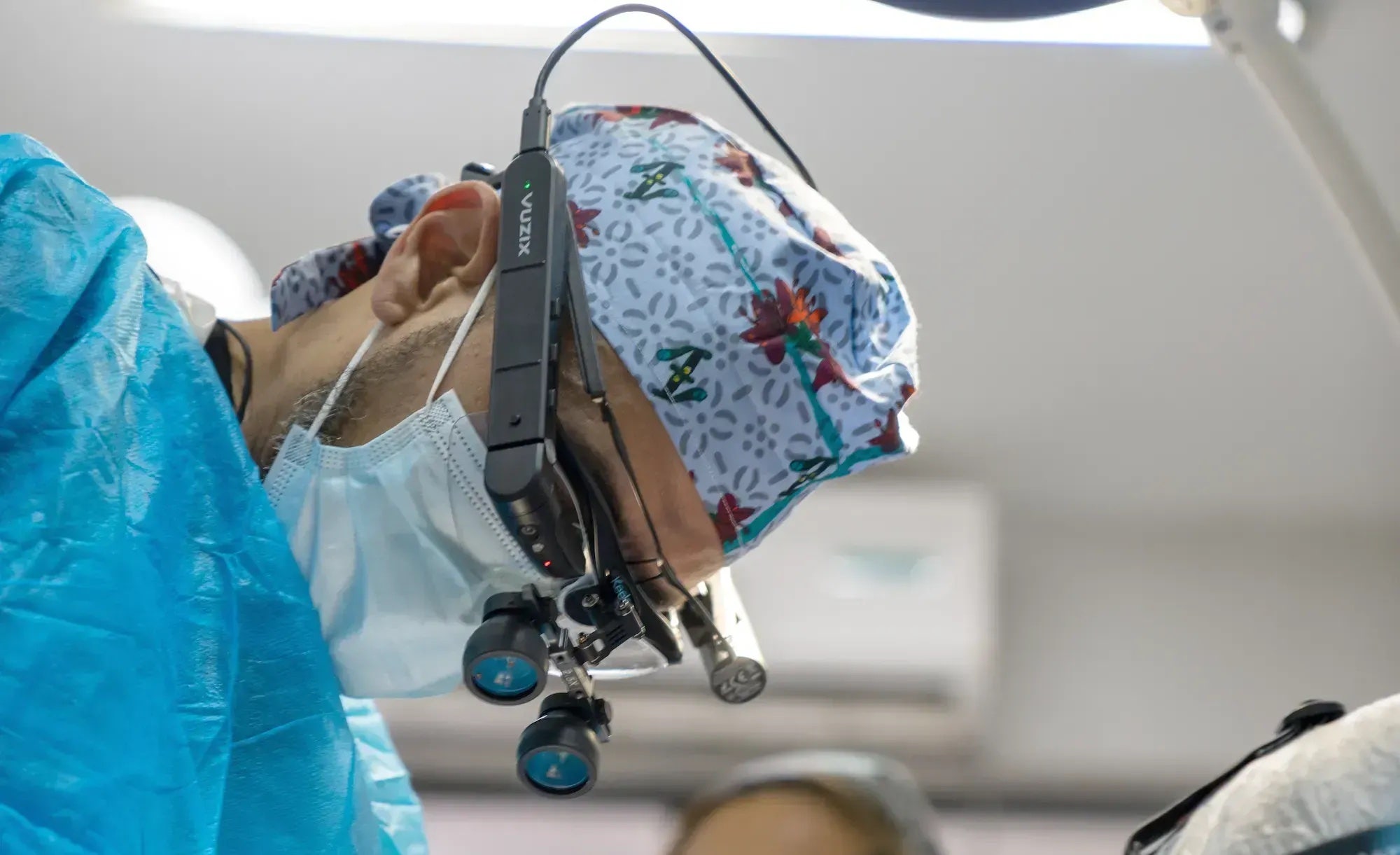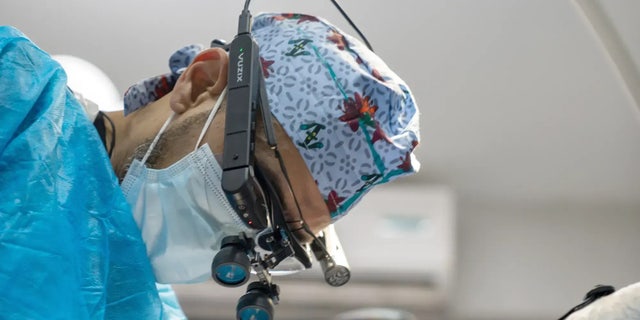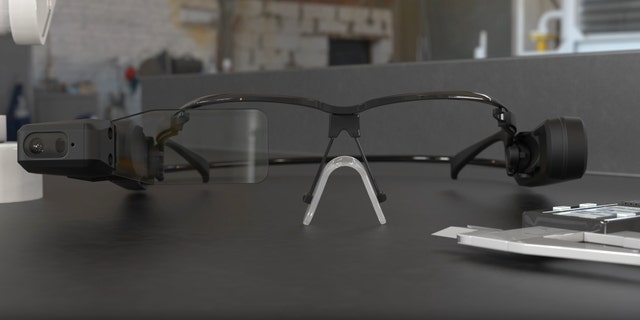Health
Doctors increasingly using AR smart glasses in operating room: ‘Potential to revolutionize surgeries’

As artificial intelligence and other technologies continue to move into the medical field, a growing number of doctors are showing interest in how these innovations can transform all aspects of patient care — including surgery.
Augmented reality (AR) smart glasses are wearable devices that enhance how people interact with the world around them. This is one such technology that’s seeing wider use.
“AR devices provide users with an enhanced view of their surroundings by overlaying digital images, graphics and information onto the physical environment they see through the glasses,” said Paul Travers, president and CEO of New York-based Vuzix, a leading supplier of smart glasses and AR technologies and products, in an interview with Fox News Digital.
AI IDENTIFIED THESE 5 TYPES OF HEART FAILURE IN NEW STUDY: ‘INTERESTING TO DIFFERENTIATE’
In the operating room, smart glasses allow surgeons to access important information they need in a real-time, hands-free environment — without having to look away from the procedure to check a computer screen.
A quarter of U.S. surgeons have already started using AR smart glasses.
Augmented reality smart glasses — wearable devices that enhance how people interact with the world around them — are in wider use today. (Vuzix)
Meanwhile, an additional 31% of surgeons are considering using them, according to a study by global research firm Censuswide, which gathered insights from over 500 surgeons across America.
Forty-nine percent of the surgeons said they believed AR smart glasses could reduce complications and fatalities in the operating room, said the study, commissioned by Vuzix.
AI TOOL HELPS DOCTORS MAKE SENSE OF CHAOTIC PATIENT DATA AND IDENTIFY DISEASES: ‘MORE MEANINGFUL’ INTERACTION
Other benefits cited by surgeons included greater access to in-depth information within their field of view, less need for entry and exit from the operating room, and potential cost reductions in surgical equipment and staff, according to a press release announcing the findings.
The surgeons also said that AR glasses could promote collaboration with remote clinical teams and could expedite prep times before surgery.

A quarter of U.S. surgeons have already started using AR smart glasses, while an additional 31% are considering using them, one study found. (Vuzix)
“This report reveals the transformative power of AR technology in improving patient outcomes,” said Travers.
“By providing real-time information, remote assistance and advanced visualization capabilities, AR smart glasses have the potential to revolutionize surgeries.”
Vuzix’s smart glasses are designed specifically to work in the operating room, Travers noted.
Unlike other larger, bulkier models, these are “super lightweight,” he said — just 2.8 ounces. “They slide right up next to the eye loops the doctor is wearing,” he added.

A surgeon at Ohana One, a Los Angeles-based company that cultivates surgical training programs using Vuzix smart glass technology in developing areas around the world, is shown using Vuzix glasses. (Ohana One/Vuzix)
“The newest pair that we just came out with, the ultralight, look exactly like a pair of Oakleys,” said Travers
AR combined with AI: ‘Game-changing stuff’
Some of the companies using Vuzix’s smart glasses technology, such as the virtual surgery platform Proximie, pair the AR smart glasses with artificial intelligence.
“Proximie is using the smart glasses to record the operations, putting them in a database and using AI to go back and compile all of that information,” Travers said.
“That way, it will be available for the next time this operation is being done, along with all the learnings that have happened in the past.”
“AR smart glasses have the potential to revolutionize surgeries.”
For example, if a surgeon is putting in a stent during heart surgery, the AI engine can provide recommendations for the best type of stent for that particular patient, based on the last thousand similar operations.”
CHATGPT SHOWS ONE DANGEROUS FLAW WHEN RESPONDING TO HEALTH CRISIS QUESTIONS, STUDY FINDS
“The AI engine can help pick and choose the best kinds of solutions, live in the operating room,” Travers said. “That’s game-changing stuff, when you have a history of thousands of operations at the doctor’s beck and call during live operations.”
Collaborating for better patient outcomes
One of the primary applications of Vuzix’s AR smart glasses is joint collaboration between doctors in different locations.
The glasses come equipped with sensors, cameras and connectivity features to enable interactive experiences. These include streaming what the wearer sees to a remote expert who can offer guidance and even draw or annotate over what the wearer is seeing in real time, said Travers.

Vuzix’s M4000 smart glasses (pictured) offer ultra-bright, see-through waveguide optics with lightweight ergonomics, the company said. (Vuzix)
A doctor in South Africa, for example, may need assistance when doing an open-heart surgery procedure for the first time. In this case, an expert in San Francisco or New York City can log in and help remotely.
“It’s just like he’s standing right next to the doctor in the operating room in South Africa — he can draw on what the doctor is seeing on the overlay of the 4K broadcast-quality camera feed and say, ‘Cut this tissue first,’ or, ‘Use this stent instead of that one,’” Travers explained.
In that type of scenario, he said, the technology actually could help save the patient’s life.
Glasses ‘merge two different views into one single view’
Doctors are also using Vuzix’s smart glasses to enhance training for medical students.
One example Travers cited is a doctor who’s getting ready to do open heart surgery and wants to teach 300 students how to do this particular kind of procedure.
Using AR smart glasses, the doctor can transmit 4K broadcast-quality video and audio as he or she operates.
HOW CREEPY AUGMENTED REALITY ENABLES SEEING THROUGH WALLS
“As the doctor is doing the operation, students from around the world can log into a HIPAA-compliant livestream and the doctor can describe each step along the way,” he said.
AR glasses offer a “huge step forward” in this type of training, which isn’t physically possible in the operating room, Travers pointed out.
“The five people who are around the doctor have just enough space to help him with the operation,” he said. “There is no way another person can sit there, let alone see what’s going on inside the chest cavity of the person that’s being operated on.”

Vuzix’s smart glasses are designed specifically to work in the operating room, the company’s CEO said. (Vuzix)
Ahmed Ghazi, a New York-based associate professor of urology and oncology at the Brady Neurological Institute at Johns Hopkins University, has been using the Vuzix smart glasses when performing surgeries — primarily to train and educate students in various locations.
The trainee wears the glasses, which project what the person is seeing onto a transparent frame that overlays Ghazi’s hands onto the field of view.
CLICK HERE TO SIGN UP FOR OUR HEALTH NEWSLETTER
“The glasses merge two different views into one single view, so I can observe what the trainee is doing,” Ghazi told Fox News Digital. “They’re able to see my hands instructing them on how to maneuver through a certain part of the procedure.”
Potential risks and limitations
One of the main limitations Ghazi has experienced with smart glasses is that there can sometimes be a lag in the transmission of information when using Wi-Fi.
However, with a solid internet connection, he said it works very well.
“We had some dropped calls initially, but then after an update, we didn’t have that issue whatsoever,” he said.
As far as using the Vuzix glasses in surgery, Ghazi said he believes the hardware and software are in place to enable that, yet more testing needs to happen first.
“We would have to go through tests to make 100% sure there are no dropped calls and no technical issues, compared to other types of virtual or augmented reality platforms,” he said.

Health
Paleo and Atkins Diets: Low-Carb for Different Reasons | Woman's World

Sign Up
Create a free account to access exclusive content, play games, solve puzzles, test your pop-culture knowledge and receive special offers.
Already have an account? Login
Forgot your password?
Get back to the Sign In
Use left and right arrow keys to navigate between menu items.
Use escape to exit the menu.
Health
7 important health stories this week you simply can't miss

Every day of the week, Fox News Digital publishes a range of health and wellness pieces to keep you up-to-date on medical research, new medications, mental health trends, success stories and more.
In case you missed them, here are a few of the biggest health stories from the past week.
As always, you can see a full list of recent health pieces at http://www.foxnews/health.
CLICK HERE TO SIGN UP FOR OUR HEALTH NEWSLETTER
1. FDA tells COVID vaccine makers to update their fall shots
The U.S. Food and Drug Administration recommended that COVID vaccine manufacturers update their formulas for fall doses, in an attempt to target the KP.2 strain of the JN.1 variant.
Dr. Marc Siegel shared insights on the risks as this variant grows more prominent. Click here to get the story.
“It makes sense to target the KP.2 strain because it is becoming the predominant strain — it is surging in California and will spread across the country,” Siegel told Fox News Digital. (iStock)
2. Expert offers 7 tips to soothe sunburned skin
If not treated properly, sunburn can lead to severe skin damage and increase the risk of skin cancer, experts warn.
Angela Rosoff, a San Francisco-based wellness and beauty expert, shared some proven remedies to treat sun-damaged skin. Click here to get the story.

More than one out of every three adults experienced a sunburn last year, according to a survey by the American Academy of Dermatology. (iStock)
3. Tiger mosquitoes blamed for spread of dengue fever
As dengue fever continues to spread throughout Europe, experts are naming an invasive mosquito species as the culprit.
CANCER NEARLY TOOK HIS LEG, BUT NEW JERSEY FATHER OF 6 WALKS AGAIN: ‘I SHOULDN’T BE HERE’
Infectious diseases experts weighed in on the level of risk and share prevention tips. Click here to get the story.

Tiger mosquitoes — the species Aedes albopictus — have spread into 13 EU countries, according to an alert from the European Centre for Disease Prevention and Control. (iStock)
4. Certain exercises could reverse Alzheimer’s, expert says
In her new book, “Reversing Alzheimer’s,” Dr. Heather Sandison, a renowned expert in dementia care, offered specific recommendations for the types of exercise that can benefit patients living with the disease.
“Exercise benefits several of the root causes of neurological disease,” she wrote. Click here to get the story.

Sunburn remedies, new COVID vaccines, anti-Alzheimer’s exercises and more important stories are covered here. (iStock)
5. Experts bust sunscreen myths
Some claims on social media about sun safety have led to a major misconception that sunscreen could cause skin cancer.
Dermatologists debunk these potentially dangerous myths. Click here to get the story.

Thirty-two percent of Americans believe that a tan makes people look better and healthier, according to the Orlando Health Cancer Institute study. (iStock)
6. New Alzheimer’s drug gets thumbs-up from FDA advisory committee
Donanemab, designed to treat mild cognitive impairment and other symptoms of early Alzheimer’s disease, was endorsed by a U.S. Food and Drug Administration advisory panel.
Here’s what that could mean for patients. Click here to get the story.

Eli Lilly officials presented clinical trial results showing that the drug, donanemab, slowed cognitive and functional decline for people with mild cognitive impairment due to early stages of Alzheimer’s. (iStock)
7. FDA panel rejects MDMA-assisted therapies for PTSD
Many veterans’ hopes were dashed when an FDA advisory committee voted against the overall benefits of MDMA when used to treat PTSD.
Advocates and doctors discussed what this means for the future of psychedelic treatments. Click here to get the story.

“When I heard the verdict, all I could think about was the hopes of those veterans being dashed … and not having a solution for them,” one advocate said. (iStock)
Health
Better Than Ozempic? Doctors Say These Medications Are Better for Weight Loss Than the Popular Semaglutide

Sign Up
Create a free account to access exclusive content, play games, solve puzzles, test your pop-culture knowledge and receive special offers.
Already have an account? Login
Forgot your password?
Get back to the Sign In
Use left and right arrow keys to navigate between menu items.
Use escape to exit the menu.
-

 News1 week ago
News1 week agoIsrael used a U.S.-made bomb in a deadly U.N. school strike in Gaza
-

 World1 week ago
World1 week agoFrance to provide Ukraine with its Mirage combat aircraft
-

 News1 week ago
News1 week agoNonprofit CFO Accused of 'Simply Astonishing' Fraud
-

 World1 week ago
World1 week agoRussia-Ukraine war: List of key events, day 833
-

 Politics1 week ago
Politics1 week agoGeorge Clooney called White House to complain about Biden’s criticism of ICC and defend wife’s work: report
-

 Politics1 week ago
Politics1 week agoNewson, Dem leaders try to negotiate Prop 47 reform off California ballots, as GOP wants to let voters decide
-

 World1 week ago
World1 week ago‘Bloody policies’: Bodies of 11 refugees and migrants recovered off Libya
-

 Politics1 week ago
Politics1 week agoEmbattled Biden border order loaded with loopholes 'to drive a truck through': critics















